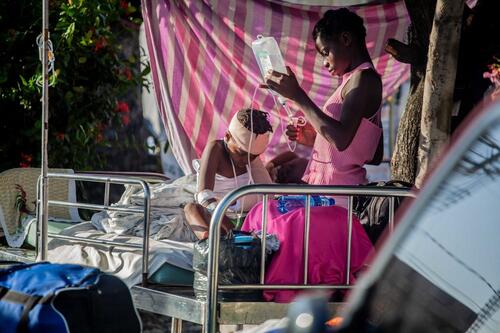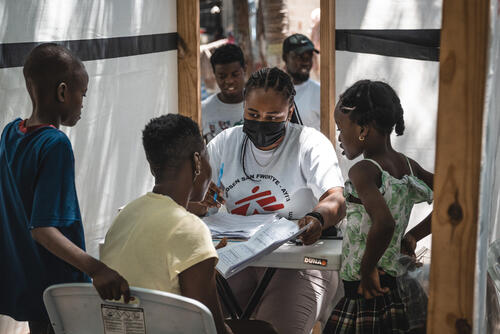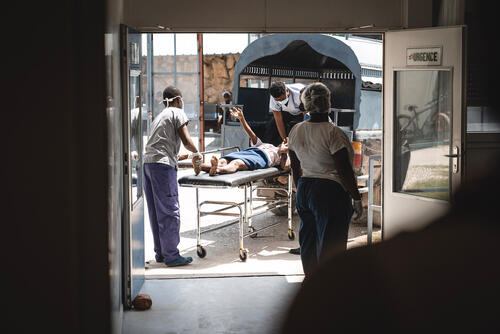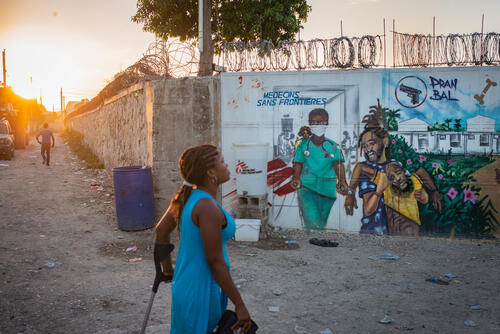On Saturday, August 14, at 8:30 am local time, the earth trembled in the southern peninsula of Haiti. A 7.2 magnitude earthquake caused severe damage to buildings, houses and main access roads in the three provinces of Grand'Anse, Nippes and Sud. The provisional death toll is estimated at more than 1,300 with more than 5,700 people injured, according to Haitian authorities.
It is difficult at the moment to get a complete mapping of the disaster, but our teams have launched exploratory missions in several localities. We have started interventions in the cities of Port-Salut, Les Cayes and Jérémie, and are preparing to step up activities in the coming days, sending medical equipment, essential items and human resources, including medical teams to care for the injured.
First interventions
In the first hours after the earthquake, a medical team from our reproductive health project in Port-à-Piment was able to quickly go to the General Hospital of Les Cayes to assess the situation and begin an intervention. Another team was deployed to the Port-Salut Hospital, where 26 wounded people have been referred, primarily from Port-à-Piment, Les Anglais and Les Cayes.
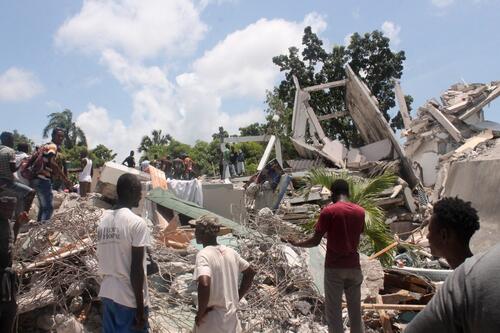
In the province of Grand'Anse, a surgical team and sterilisation equipment have been sent to St. Antoine's Hospital in the city of Jérémie. Meanwhile, in the province of Nippes, material support was given to the Sainte-Thérèse hospital in Miragoâne.
“Our current priorities are, above all else, to get a precise idea of the medical situation and to provide direct care to the injured when we can or to refer them to functional medical structures once we ensure they are stabilised,” says Alessandra Giudiceandrea, MSF head of mission in Haiti.
Several evaluations are currently underway in Baradères, Petit Trou, Les Anglais, Corail and Pestel. Depending on the situation on the ground, we may deploy other medical teams, distribute essential items or begin water and sanitation activities. Wherever we can, our medical teams help refer the injured to functional health facilities.
Many patients are outside or in tents, and heavy rains are expected tonight. Not to mention all the Haitians who have lost their homes.Michel-Olivier Lacharité, MSF head of emergencies
Main challenges
The transport of medical teams and equipment is one of the main challenges today. Several roads have been cut off, notably those between Les Cayes and Jérémie and between Port-à-Piment and Les Anglais. Landslides, which have damaged access roads, slow down and complicate the deployment of relief supplies and the delivery of aid. In order to gain faster access to remote areas, we will hire a helicopter, transport equipment and refer injured people. Travel by sea is also a possibility.
Another cause for concern is tropical storm Grace – expected to pass by the earthquake zone on the night of 16 August – 17 August.
“Several health facilities have had to evacuate their patients from buildings due to structural damage or for fear of aftershocks, such as at St. Antoine Hospital in the city of Jérémie, where we are working,” says Michel-Olivier Lacharité, MSF head of emergencies. “Many patients are outside or in tents, and heavy rains are expected tonight. Not to mention all the Haitians who have lost their homes,” says Lacharité.
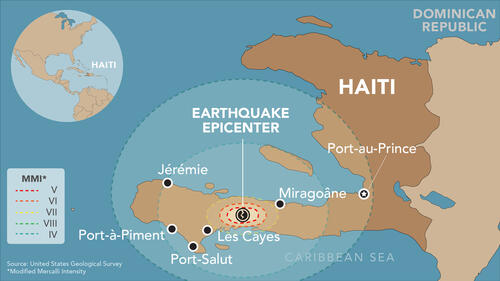
On top of everything, the security situation in Haiti is a factor that cannot be ignored. The main road to southwestern Haiti passes through Martissant, a neighbourhood of Port-au-Prince particularly affected by violence between armed groups. Although armed gangs have declared a ceasefire there, the general insecurity in Haiti is complicating the deployment of relief supplies. Even before the earthquake, health facilities in the provinces of Haiti's southern peninsula were experiencing numerous malfunctions and supply problems.
Response in Port-au-Prince
In Port-au-Prince, the earthquake fortunately did not damage any infrastructure or buildings. Our teams, who have been working for several years at the Tabarre Hospital, received 12 injured patients from the earthquake zone. In the Turgeau neighbourhood, we have accelerated the opening of activities at the Integrated Diagnosis and Treatment Centre (CDTI), commonly known as the Sacré-Cœur Hospital, in order to be able to stabilise injured patients and refer them elsewhere. In one day, 25 injured patients were received. A blood collection campaign has also been launched to address potential shortages.
Strengthening our intervention
In the coming days, other medical teams including surgical staff should be able to train and provide reinforcements in several locations in the three most affected provinces. Medical supplies, water and sanitation supplies, and basic essentials such as tents will also be flown to Haiti.



